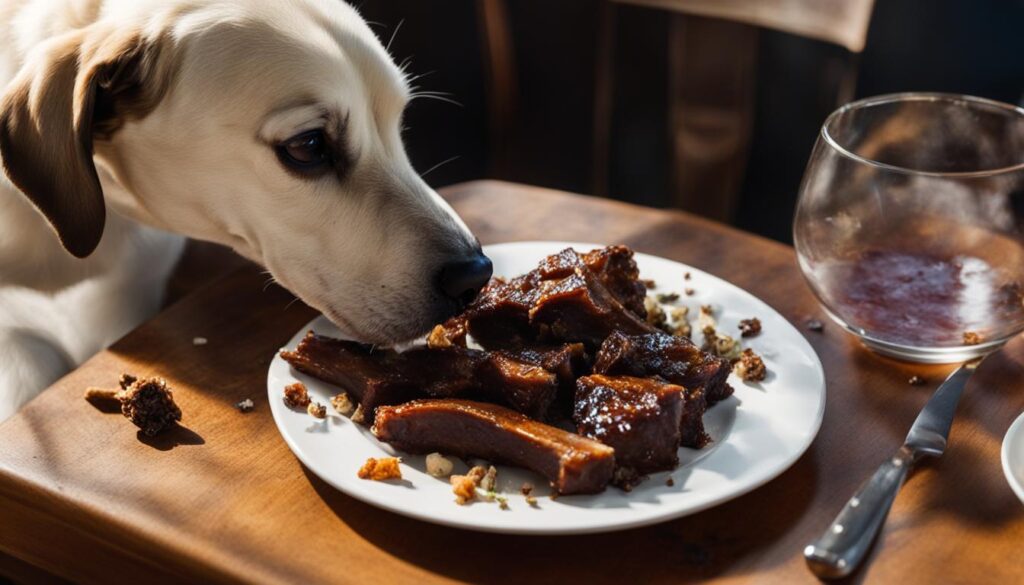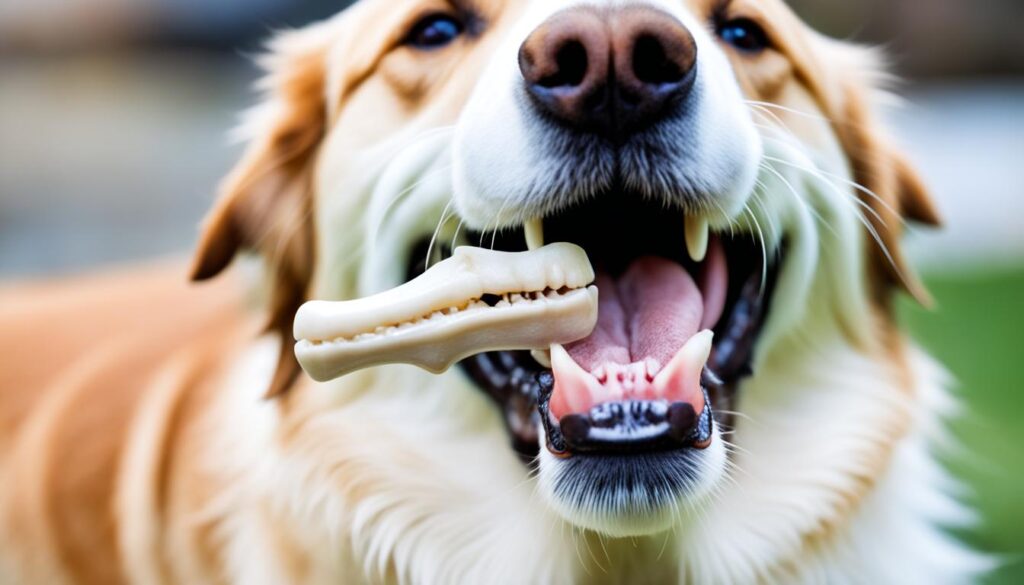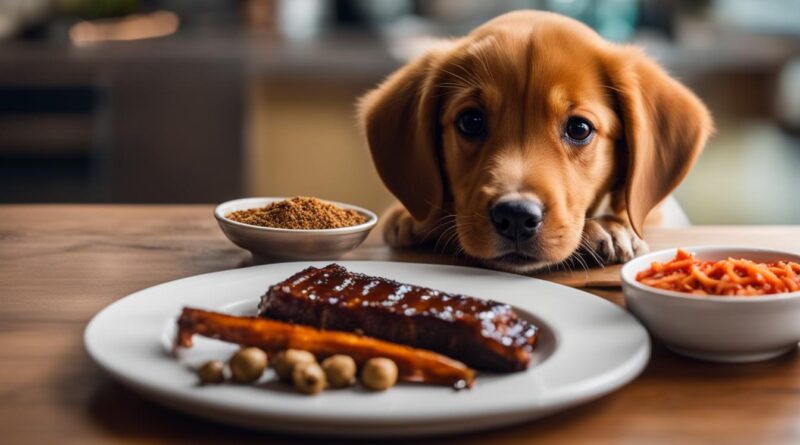Can Dogs Eat Ribs? Safe Feeding Tips Revealed
When it comes to feeding our furry friends, it’s important to ensure their safety and well-being. As a dog owner, you may wonder if it’s safe to give them ribs as a treat or as part of their diet. In this article, we will explore whether dogs can eat ribs and the potential risks associated with feeding them this popular human food.
Key Takeaways:
- Giving dogs ribs can pose risks due to the bones, which can cause choking, digestion problems, and injury to the gastrointestinal tract.
- Raw ribs may carry bacteria and parasites that can be harmful to both dogs and humans.
- Cooked rib bones are even riskier as they can break, potentially causing obstructions and perforations in the intestinal tract.
- It is recommended to avoid giving dogs meat with additives or seasonings that may upset their stomachs or be toxic to them.
- Safer alternatives for satisfying a dog’s chewing needs include durable chew toys and chew bone treats.
Now, let’s delve deeper into the potential risks of feeding dogs ribs and explore safe feeding practices to ensure the health and well-being of our beloved pets.
The Risks of Feeding Dogs Raw Ribs
When it comes to feeding dogs raw ribs, there are potential risks that pet owners need to be aware of. While raw ribs may seem like a natural treat for dogs, there are several reasons why veterinarians generally advise against letting dogs chew on them without close supervision.
One of the main concerns with raw ribs is the potential for food poisoning. Raw meat, including raw pork found in ribs, can harbor harmful bacteria such as Salmonella or E. coli. These bacteria can cause severe gastrointestinal issues and pose a significant risk to the health of both dogs and their owners. Handling raw ribs can also transfer bacteria to surfaces, increasing the risk of contamination.
Another risk associated with feeding dogs raw ribs is the transmission of a roundworm called Trichinella spiralis. This parasite can be found in raw pork and can lead to a condition known as Trichinosis. Trichinosis can cause symptoms such as muscle pain, fever, diarrhea, and in some cases, can be fatal. It is important to note that humans are also susceptible to Trichinosis if they consume undercooked or raw pork.
While raw ribs may pose less risk of obstruction or choking compared to cooked rib bones, it is still essential to closely supervise dogs when they chew on them. Dogs can sometimes be aggressive chewers and may accidentally swallow large chunks of raw rib bone, leading to digestive issues and potential blockages.
To summarize, feeding dogs raw ribs carries potential risks such as food poisoning and the transmission of parasites. It is generally advised to avoid giving dogs raw ribs unless closely supervised. Instead, consider safer alternatives for satisfying your dog’s chewing needs, such as durable chew toys or specially designed chew bone treats.
Risks of Feeding Dogs Raw Ribs
| Risks | Explanation |
|---|---|
| Food Poisoning | Raw ribs can harbor harmful bacteria like Salmonella or E. coli, posing a risk of severe gastrointestinal issues. |
| Trichinosis | Raw pork found in ribs can contain Trichinella spiralis, a roundworm that can lead to Trichinosis in both dogs and humans. |
| Choking and Obstruction | Dogs may accidentally swallow large chunks of raw rib bones, resulting in potential digestive issues and blockages. |
It is always important to prioritize the safety and well-being of our furry companions. When in doubt, consult with your veterinarian for personalized dietary recommendations based on your dog’s specific needs and health condition.
The Dangers of Cooked Rib Bones
Cooking rib bones can turn a seemingly harmless treat into a serious danger for dogs. When ribs are cooked, the bones become weaker and more prone to breakage. This can lead to a range of potential risks and health issues for our furry friends.
Broken Bones and Obstructions: Cooked rib bones can splinter easily, creating sharp fragments that can cause injuries and obstructions in a dog’s digestive system. If a bone splinters or fragments are swallowed, it can lead to choking or blockage, requiring immediate medical attention.
Intestinal Perforation and Sepsis: The sharp edges of cooked rib bones can cause severe damage to the intestinal tract if swallowed. This can lead to perforations, which allow bacteria to enter the abdominal cavity, causing sepsis. Sepsis is a life-threatening condition that can lead to organ failure and even death if left untreated.
To protect dogs from the potential risks of cooked rib bones, it is crucial to keep them out of reach. Make sure to properly dispose of any leftover bones and never leave them unattended where a curious dog may find them.
“The weakened and splinter-prone nature of cooked rib bones makes them a significant hazard for dogs. It’s best to prevent access to cooked rib bones to safeguard our pets from potential injuries and emergencies.”
If you suspect your dog has ingested cooked rib bones or is experiencing any symptoms such as difficulty breathing, vomiting, or abdominal pain, it is essential to seek immediate veterinary attention.

| Potential Risks of Dogs Eating Cooked Rib Bones | Possible Consequences |
|---|---|
| Bone splintering | Choking, obstructed airway or digestive system |
| Ingested bone fragments | Intestinal blockage, emergency surgery |
| Intestinal perforation | Sepsis, life-threatening infection |
Table: Potential Risks of Dogs Eating Cooked Rib Bones and Their Consequences
Proper Feeding Practices for Dogs
Feeding dogs a proper diet is essential for their overall health and well-being. When it comes to feeding dogs ribs, there are certain precautions that need to be taken to ensure their safety. Here are some important feeding practices to keep in mind:
- Avoid additives: It is recommended to avoid giving dogs cooked rib meat that contains additives like sauce or seasoning. These additives can upset their stomachs or cause other health problems. Stick to lean, unseasoned cooked rib meat.
- Watch out for salt, sugar, and fat: Dogs should have a balanced diet without excessive amounts of salt, sugar, and fat. These ingredients can lead to obesity, heart problems, and other health issues. When feeding dogs cooked rib meat, make sure it is lean and not excessively fatty.
- Avoid toxic foods: Onions and garlic, which can be found in some seasonings, are toxic to dogs in large quantities. Avoid using seasonings that contain these ingredients when preparing cooked rib meat for dogs.
- Monitor dogs around rib bones: When dogs are near rib bones, it is crucial to closely monitor them to prevent choking or ingestion of dangerous bone fragments. Dogs should never be left unsupervised when chewing on rib bones.
Incorporating these feeding practices will help ensure that your dog’s diet is safe and nutritionally balanced. Remember, it’s always best to consult with a veterinarian for specific feeding recommendations based on your dog’s individual needs.

| Safe Human Foods for Dogs | Foods to Avoid |
|---|---|
| Lean cooked meats (chicken, turkey, lean beef) | Chocolate |
| Carrots | Grapes and raisins |
| Plain cooked rice or pasta | Onions and garlic |
| Apples (without seeds) | Avocado |
| Peanut butter (without xylitol) | Alcohol |
Conclusion
In conclusion, when it comes to feeding dogs ribs, it is crucial to prioritize their safety. While small amounts of lean, unseasoned cooked rib meat may be permissible, it is best to avoid giving them bones altogether. This precaution helps prevent potential choking hazards, digestion problems, and injuries to their gastrointestinal tract.
To meet a dog’s chewing needs, there are safer alternatives available, such as durable chew toys or chew bone treats. Not only do these options keep your furry friend engaged and entertained, but they also promote dental health, reducing the risk of dental diseases.
Remember, every dog is unique, and dietary requirements can vary. Therefore, it is always recommended to consult with a veterinarian for specific feeding recommendations tailored to your dog’s individual needs. By prioritizing their well-being and following safe feeding practices, you can ensure that your canine companion leads a happy and healthy life.
FAQ
Can dogs eat cooked ribs?
While it is not inherently toxic for dogs to consume cooked pork or beef rib meat, the bones present a more complicated issue. Veterinarians caution against giving dogs animal bones due to the risk of choking, digestion problems, and sharp bones causing injury in the gastrointestinal tract.
Are raw ribs safe for dogs?
Raw ribs can potentially cause food poisoning due to bacteria, such as from handling the raw meat. Raw pork can also transmit a roundworm called Trichinella spiralis, leading to Trichinosis in both humans and pets. While raw ribs may pose less risk of obstruction or choking, veterinarians generally advise against letting dogs chew on them unless closely supervised.
Can dogs chew on cooked rib bones?
Cooked rib bones are even riskier than raw bones, as cooking weakens and dries out the bones, making them more likely to break. These broken bones can cause foreign body obstructions that may require surgery and can also perforate the intestinal tract, leading to sepsis and potentially death. It is important to keep cooked rib bones away from dogs to prevent these dangerous situations.
What should I avoid when giving my dog ribs to eat?
It is recommended to avoid giving dogs cooked rib meat that contains additives like sauce or seasoning, as these can upset their stomachs or cause other health problems. Lean, unseasoned cooked rib meat can be offered in small amounts, but it is important to avoid excessive salt, sugar, and fat in a dog’s diet. Onions and garlic, which can be found in some seasonings, are toxic to dogs in large quantities. It is also crucial to monitor dogs when they are near rib bones to prevent choking or ingestion of dangerous fragments.
What is the proper diet for dogs?
Dogs require a balanced diet consisting of high-quality dog food that provides the necessary nutrients they need. It is important to consult with a veterinarian for specific feeding recommendations based on your dog’s breed, age, size, and any underlying health conditions.
Are there safe human foods for dogs?
Yes, there are some safe human foods that dogs can enjoy in moderation, such as lean meats (without seasoning), cooked vegetables, plain rice, and small amounts of fruits like apples or bananas. However, it is essential to research specific foods before feeding them to your dog, as some human foods can be toxic, such as chocolate, grapes, raisins, and certain nuts.


